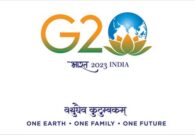Looking forward to India’s participation at the G7
The UK will host the G7 group of nations on Friday 11th-Sunday 13th June, 2021 in Carbis Bay, Cornwall. Joining Prime Minister Boris Johnson, will be the leaders of the G7 nations (Germany, Italy, France, Canada, Japan, and the US), the EU and four guest countries - South Korea, Australia, South Africa, and India.
The G7 (“the Group of Seven”) typically covers a wide array of issues: economic, environmental, health, trade, development and foreign policy issues. This quote from PM Johnson is a good example of the motivation and significance of the group: “As the most prominent grouping of democratic countries, the G7 has long been the catalyst for decisive international action to tackle the greatest challenges we face. From cancelling developing world debt to our universal condemnation of Russia’s annexation of Crimea, the world has looked to the G7 to apply our shared values and diplomatic might to create a more open and prosperous planet.”
Why is India attending?
India’s invitation as a guest country demonstrates the high regard in which India is held, not only at a multilateral level but also bilaterally as a guest of the UK. Of course, India is a permanent member of the G20, for which it is set to host the 2023 summit. It is entirely right that India has been invited to attend this G7 gathering – it is the fifth largest economy in the world, it is a leading democracy, and it is increasingly playing an important role in multilateral forums such as the Solar Alliance, which India leads, and with COP26 only 5 months away it is critical that India is at the table in Cornwall.
What will this year’s summit cover?
This year is set to focus on building back better from the COVID-19 pandemic and creating a greener, more prosperous future. Although the country leaders will not meet until Friday, senior Ministers have already been meeting over the last couple of weeks.
On 3rd and 4th June, the G7 Health Ministers’ Meeting saw a commitment to continue support for science-based responses to COVID-19, and to promote high quality, interdisciplinary research and development to improve future pandemic preparedness. This includes sharing of information and data, developing health systems around the world, and coordinating on related matters such as travel and trade. There was also affirmed support for equitable distribution of safe and effective COVID-19 diagnostics, therapeutics and vaccines, under the Access to COVID-19 Tools Accelerator (ACT-A) which includes the COVAX facility. Increased cooperation on vaccines and wider healthcare will not only support our countries’ own populations but will bring benefits to countries across the world by saving lives and supporting the economic recovery.
On 4th and 5th June, the G7 Finance Ministers met, joined by the Heads of multilateral organisations such as the IMF and World Bank. The discussions majored on how to achieve a global recovery that builds back better from the pandemic in terms of sustainability and of tackling inequality. A consensus was agreed that climate change and biodiversity loss must be embedded into economic and financial decision-making. Addressing the macroeconomic impacts of economic decisions through use of policy levers such as carbon pricing will be critical to the climate change solution by incentivising behaviour away from fossil fuels to greener alternatives and funding the research, development, and production of viable solutions.
There was also a “historic” two-part deal on taxing multinational companies. The first was to make companies pay tax in the countries where they do business and the second an agreement in principle to ratify a global minimum corporate tax rate starting at 15 percent. This is much welcomed progress, helping to ensure that sufficient taxes go to the right places and support host country development. The UK’s existing corporate tax rate stands at 19 percent, but is set to rise to 25 percent as announced at the UK Budget in March 2021. India, on the other hand, recently reduced its CTR to an effective rate, inclusive of surcharge and cess, of 25.17 percent (as of September 2019).
Expectations
Prime Minister Modi will not attend the meeting in person due to the ongoing COVID situation in India. Nonetheless, we would expect that he, together with PM Johnson, will be a keen supporter for the two pillars of this year’s summit, climate change and combatting COVID.
As by far the largest country at the summit, and one of two representatives of the developing world (alongside South Africa), India is distinctive among the participating nations. Add to that India’s might in COVID-19 vaccine production, we can expect equitable distribution of vaccines to be front and centre of PM Modi’s motivations.
Similarly, with COP26 taking place later this year, India may use the summit as an opportunity to highlight the two-pronged goal of energy security and energy transition. With the recent UK-India bilateral commitments to collaborate on climate change adaptation and energy underway, and the UK acting as COP26 hosts, Prime Minister Boris Johnson will no doubt be pushing other member countries to lend their support. In any case, statements and agreements are a positive start, but action is what is needed.

 By Kealan Finnegan
By Kealan Finnegan 


